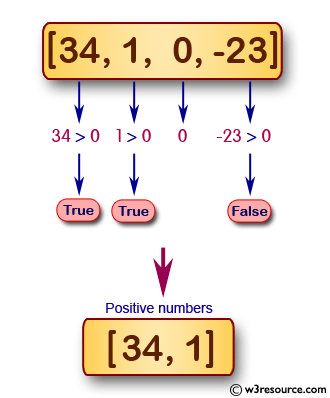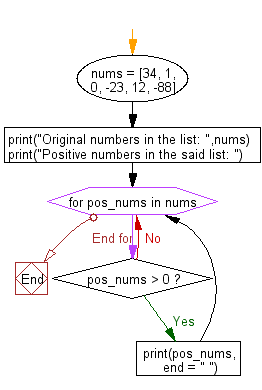Python: Filter the positive numbers from a list
Filter Positive Numbers
Write a Python program to filter positive numbers from a list.
Positive Numbers: Any number above zero is known as a positive number. Positive numbers are written without any sign or a '+' sign in front of them and they are counted up from zero, i.e. 1, + 2, 3, +4 etc.
Pictorial Presentation:

Sample Solution-1:
Python Code:
# Define a list named "nums" containing a series of integers.
nums = [34, 1, 0, -23, 12, -88]
# Print a message along with the original list of numbers.
print("Original numbers in the list: ", nums)
# Create a new list "new_nums" by using the "filter" function with a lambda function
# that filters out positive numbers from the "nums" list.
new_nums = list(filter(lambda x: x > 0, nums))
# Print a message along with the list of positive numbers from the "nums" list.
print("Positive numbers in the said list: ", new_nums)
Sample Output:
Original numbers in the list: [34, 1, 0, -23, 12, -88] Positive numbers in the said list: [34, 1, 12]
Sample Solution-2:
Python Code:
# Define a list named "nums" containing a series of integers.
nums = [34, 1, 0, -23, 12, -88]
# Print a message along with the original list of numbers.
print("Original numbers in the list: ", nums)
# Print a message indicating that positive numbers in the list will be listed.
print("Positive numbers in the said list: ")
# Iterate through each number in the "nums" list.
for pos_nums in nums:
# Check if the number is greater than 0 (positive).
if pos_nums > 0:
# Print positive numbers on the same line with a space separator.
print(pos_nums, end=" ")
Sample Output:
Original numbers in the list: [34, 1, 0, -23, 12, -88] Positive numbers in the said list: 34 1 12
Flowchart:

Sample Solution-3:
Python Code:
# Define a list named "nums" containing a series of integers.
nums = [34, 1, 0, -23, 12, -88]
# Print a message along with the original list of numbers.
print("Original numbers in the list: ", nums)
# Create a new list "pos_nums" using a list comprehension to filter positive numbers from "nums."
# Positive numbers are those greater than 0.
pos_nums = [n for n in nums if n > 0]
# Print a message indicating that positive numbers in the list will be listed,
# followed by the positive numbers separated by a space.
print("Positive numbers in the said list: ", *pos_nums)
Sample Output:
Original numbers in the list: [34, 1, 0, -23, 12, -88] Positive numbers in the said list: 34 1 12
For more Practice: Solve these Related Problems:
- Write a Python program to filter negative numbers from a list.
- Write a Python program to remove zero values from a list.
- Write a Python program to find all even numbers in a list using the filter function.
- Write a Python program to count the number of positive numbers in a list.
Go to:
Previous: Write a Python program to input a number, if it is not a number generates an error message.
Next: Write a Python program to compute the product of a list of integers (without using for loop).
Python Code Editor:
Test your Programming skills with w3resource's quiz.
It will be nice if you may share this link in any developer community or anywhere else, from where other developers may find this content. Thanks.
https://165.227.97.55/python-exercises/python-basic-exercise-114.php
- Weekly Trends
- Java Basic Programming Exercises
- SQL Subqueries
- Adventureworks Database Exercises
- C# Sharp Basic Exercises
- SQL COUNT() with distinct
- JavaScript String Exercises
- JavaScript HTML Form Validation
- Java Collection Exercises
- SQL COUNT() function
- SQL Inner Join
- JavaScript functions Exercises
- Python Tutorial
- Python Array Exercises
- SQL Cross Join
- C# Sharp Array Exercises
